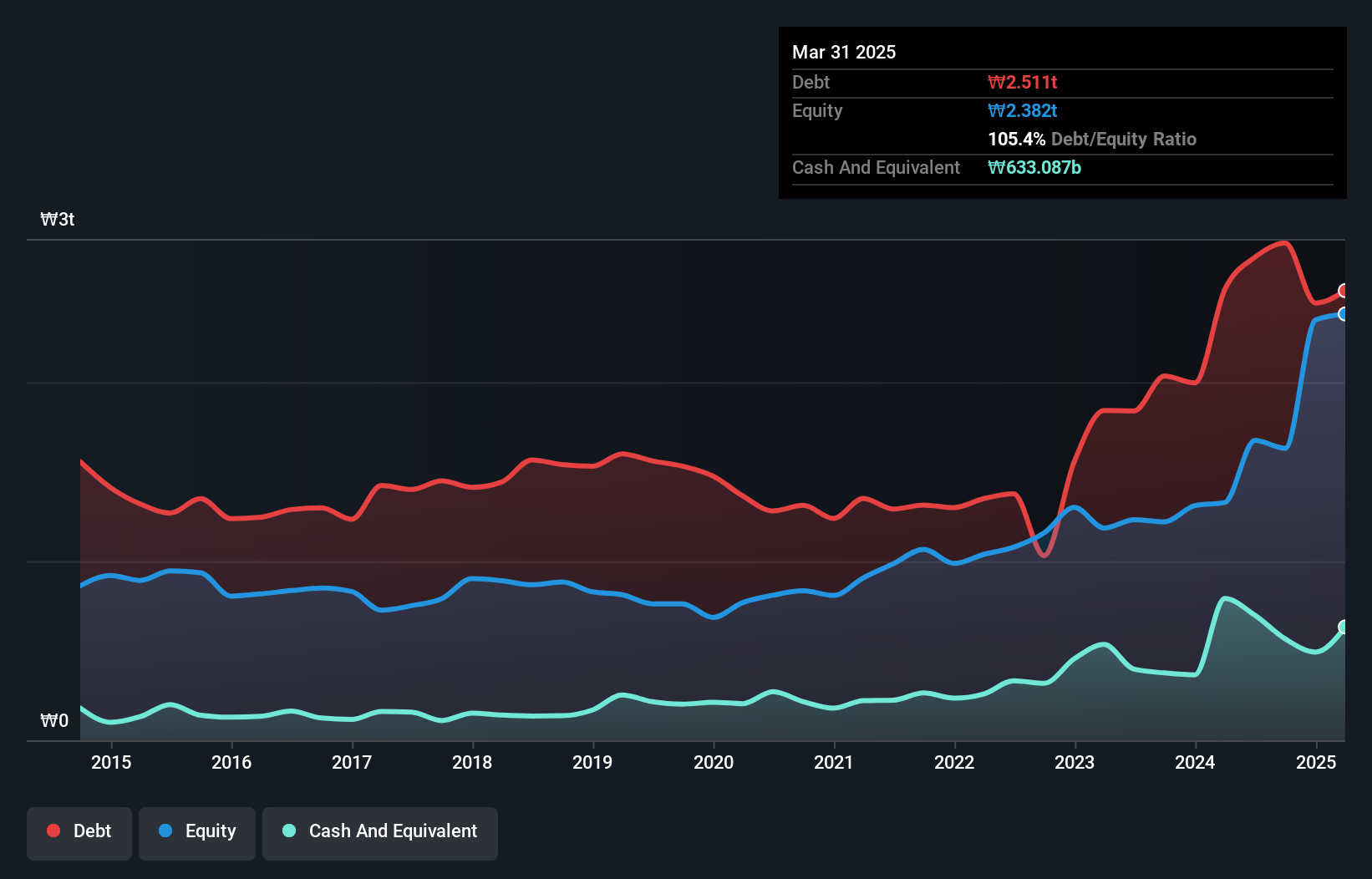
Legendary fund manager Li Lu (who Charlie Munger backed) once said, 'The biggest investment risk is not the volatility of prices, but whether you will suffer a permanent loss of capital.' So it seems the smart money knows that debt - which is usually involved in bankruptcies - is a very important factor, when you assess how risky a company is. We can see that Kolon Corporation (KRX:002020) does use debt in its business. But is this debt a concern to shareholders?
When Is Debt Dangerous?
Debt is a tool to help businesses grow, but if a business is incapable of paying off its lenders, then it exists at their mercy. Ultimately, if the company can't fulfill its legal obligations to repay debt, shareholders could walk away with nothing. However, a more frequent (but still costly) occurrence is where a company must issue shares at bargain-basement prices, permanently diluting shareholders, just to shore up its balance sheet. Of course, the upside of debt is that it often represents cheap capital, especially when it replaces dilution in a company with the ability to reinvest at high rates of return. When we examine debt levels, we first consider both cash and debt levels, together.
What Is Kolon's Debt?
As you can see below, Kolon had ₩2.51t of debt, at March 2025, which is about the same as the year before. You can click the chart for greater detail. However, it does have ₩633.1b in cash offsetting this, leading to net debt of about ₩1.88t.

How Healthy Is Kolon's Balance Sheet?
We can see from the most recent balance sheet that Kolon had liabilities of ₩3.60t falling due within a year, and liabilities of ₩1.33t due beyond that. Offsetting this, it had ₩633.1b in cash and ₩1.07t in receivables that were due within 12 months. So its liabilities outweigh the sum of its cash and (near-term) receivables by ₩3.23t.
The deficiency here weighs heavily on the ₩694.8b company itself, as if a child were struggling under the weight of an enormous back-pack full of books, his sports gear, and a trumpet. So we'd watch its balance sheet closely, without a doubt. After all, Kolon would likely require a major re-capitalisation if it had to pay its creditors today. The balance sheet is clearly the area to focus on when you are analysing debt. But it is Kolon's earnings that will influence how the balance sheet holds up in the future. So when considering debt, it's definitely worth looking at the earnings trend. Click here for an interactive snapshot.
Check out our latest analysis for Kolon
In the last year Kolon wasn't profitable at an EBIT level, but managed to grow its revenue by 2.4%, to ₩6.1t. We usually like to see faster growth from unprofitable companies, but each to their own.
Caveat Emptor
Importantly, Kolon had an earnings before interest and tax (EBIT) loss over the last year. Indeed, it lost a very considerable ₩105b at the EBIT level. If you consider the significant liabilities mentioned above, we are extremely wary of this investment. Of course, it may be able to improve its situation with a bit of luck and good execution. Nevertheless, we would not bet on it given that it vaporized ₩332b in cash over the last twelve months, and it doesn't have much by way of liquid assets. So we think this stock is risky, like walking through a dirty dog park with a mask on. There's no doubt that we learn most about debt from the balance sheet. However, not all investment risk resides within the balance sheet - far from it. We've identified 3 warning signs with Kolon (at least 2 which are a bit unpleasant) , and understanding them should be part of your investment process.
If you're interested in investing in businesses that can grow profits without the burden of debt, then check out this free list of growing businesses that have net cash on the balance sheet.
Valuation is complex, but we're here to simplify it.
Discover if Kolon might be undervalued or overvalued with our detailed analysis, featuring fair value estimates, potential risks, dividends, insider trades, and its financial condition.
Access Free AnalysisHave feedback on this article? Concerned about the content? Get in touch with us directly. Alternatively, email editorial-team (at) simplywallst.com.
This article by Simply Wall St is general in nature. We provide commentary based on historical data and analyst forecasts only using an unbiased methodology and our articles are not intended to be financial advice. It does not constitute a recommendation to buy or sell any stock, and does not take account of your objectives, or your financial situation. We aim to bring you long-term focused analysis driven by fundamental data. Note that our analysis may not factor in the latest price-sensitive company announcements or qualitative material. Simply Wall St has no position in any stocks mentioned.
About KOSE:A002020
Kolon
Engages in market research and management consulting, and intellectual property licensing businesses in South Korea and internationally.
Slight and slightly overvalued.
Similar Companies
Market Insights
Community Narratives




